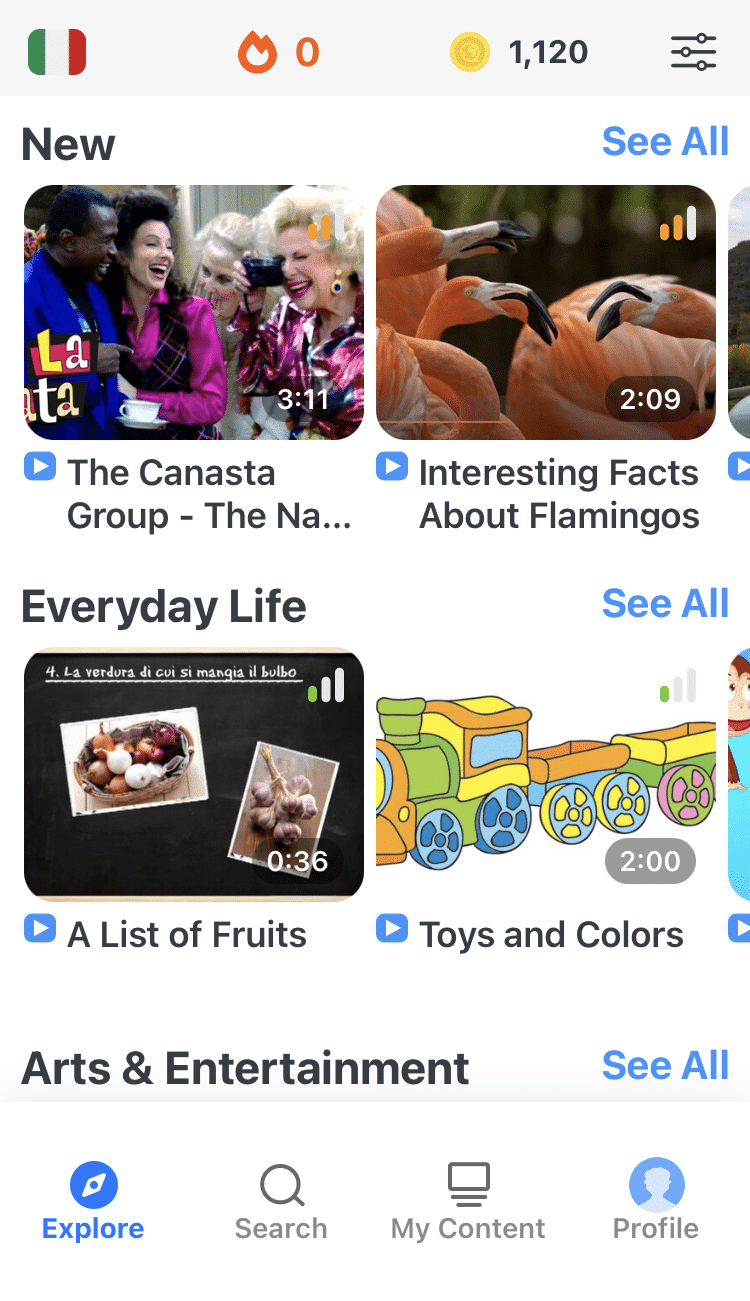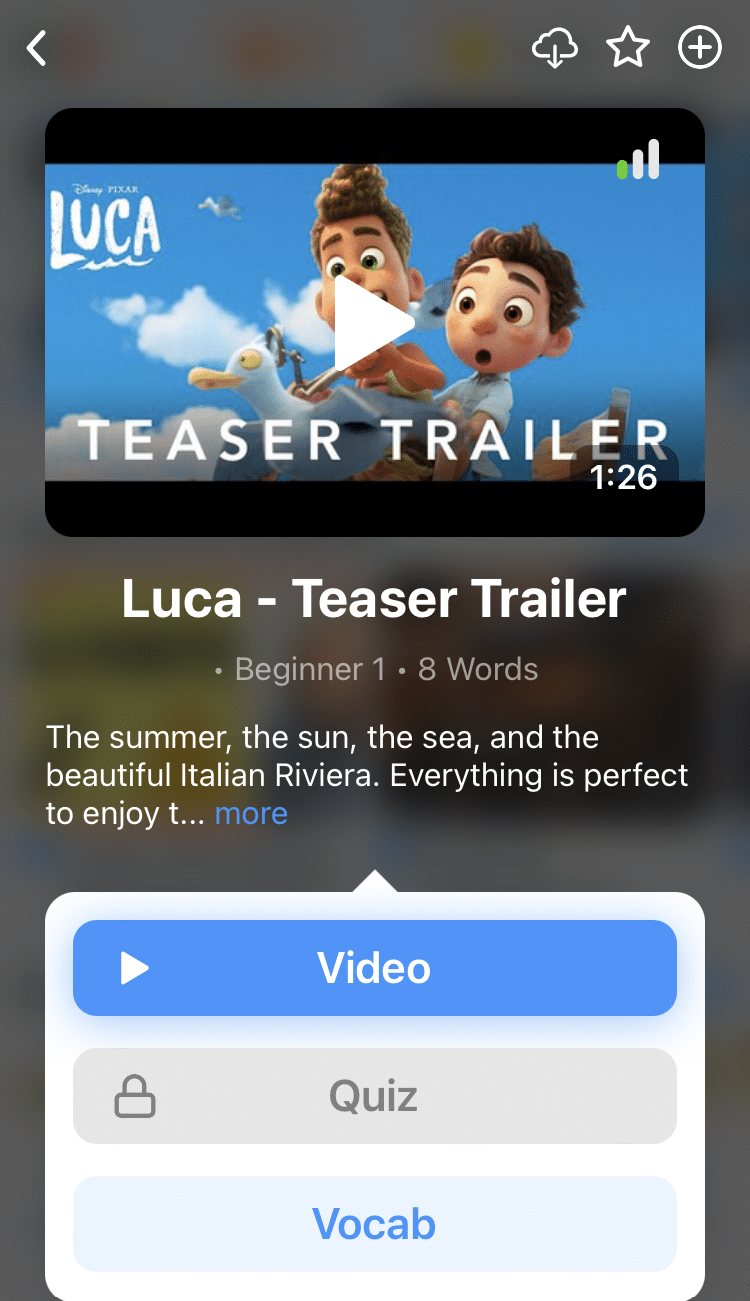
Is Italian Worth Learning?
Are you considering taking up Italian? Perhaps you’re looking for reasons to dive into it?
Or perhaps you already have your reasons (like traveling to the country or meeting your significant other’s family), but you’re still on the fence as to whether that’s enough to kickstart your Italian learning journey.
Regardless, we’ve got 10 other reasons why you should start picking up this beautiful language today.
Contents
- 1. Italy is a great place to visit
- 2. Italian food is all around us
- 3. You’ll experience Italian movies more deeply
- 4. You’ll better appreciate Italian music
- 5. You’ll open up more chances for friendship or amore (love)
- 6. Learning Italian is quite easy for English speakers
- 7. Italian helps you learn other Romance languages
- 8. Italian hand gestures are fun to learn
- 9. Knowing Italian can give you a leg up in your career
- 10. Italian is a beautiful language
- And One More Thing...
Download: This blog post is available as a convenient and portable PDF that you can take anywhere. Click here to get a copy. (Download)
1. Italy is a great place to visit
In Italy, even just a little spoken Italian will open doors and make native speakers warm up to you. You can get a more authentic experience if you’re able to brave the markets and negotiate with the vendors in their language.
And how about taking full advantage of the Italian tradition of passeggiata, the ritual of aimlessly walking the streets—gelato in hand—looking at people and being seen?
You’ll understand what the storefronts say, follow traffic signs and get a chuckle at what those Italian teenagers have written on those walls (and what the tour guides wouldn’t translate).
2. Italian food is all around us
Italian food, from pasta to pizza, is some of the world’s best. And since Italian restaurants are everywhere, you’ll be able to use your restaurant Italian wherever you go.
Knowing Italian makes for a better dining experience. For example, panna cotta literally means “cooked cream,” the pasta cannelloni means “large tubes” and espresso means “pressed out.”
3. You’ll experience Italian movies more deeply
Our first two reasons for learning Italian both have something to do with living “the good life” or “La Dolce Vita.” (Incidentally, that’s also the title of one of the most acclaimed Italian films of all time.)
Speaking of Italian films, there’s a host of world-renowned directors—like Fellini, Antonioni and Visconti—whose visual aesthetics have influenced today’s international and Italian cinema. The stories they tell can only be fully appreciated in the Italian language.
If those directors don’t convince you of the benefits of hearing films in the original language, I recommend you check out the likes of “I Cento Passi” (“One Hundred Steps”) or “La Grande Bellezza” (“The Great Beauty”). I’m sure you’ll then understand why Italy bags the Academy Award for Best Foreign Language Film more than any other country.
4. You’ll better appreciate Italian music
Since we’re talking about great cultural contributions, we might as well bring up Italian music. Learning the language opens up a whole category of songs and lyrics that can only move you like Italian can. (Did you know that Mozart, the venerated German composer, wrote many of his operas in Italian?)
But you don’t even have to go back hundreds of years for this one. You can appreciate modern Italian music with the likes of Pavarotti or Bocelli. And if you’re looking for more pop fare, you can go with Pausini or Mengoni.
You can also use Italian music to learn the language. For instance, you can find an array of Italian music videos and other engaging clips on the language learning platform FluentU. These videos come with clickable subtitles that can pull up vital information about words like their English translation, part of speech, pronunciation and more.
5. You’ll open up more chances for friendship or amore (love)
Learning Italian gives you the ability to create and nurture relationships with native speakers. Trust me: Your life will change when you gain an Italian as a close friend or as an intimate partner.
If you’re interested in learning Italian while also making friends, try Tandem. It’s a language exchange app that helps you look for Italian native speakers who want to learn English. They’ll help you polish your Italian, and you’ll help them sort out their English. It’s a win-win!
6. Learning Italian is quite easy for English speakers
Just how easy is it to learn Italian? According to the Foreign Service Institute, the US government’s premier language training institution, Italian is considered a Category 1 Language.
What this means is that a native English speaker, on average, requires only around 24 weeks or 600 hours of language training before reaching general proficiency in Italian. (Compare that to Category 4 languages like Japanese, which requires a headache-inducing 2,200 hours.)
Better yet, there are lots of cognates between Italian and English, like agente (agent), finale (final), impossibile (impossible), diligente (diligent) and melodia (melody).
There’s also a strong correlation between how you spell a word and how you pronounce it in Italian. There aren’t many silent letters, missing sounds and mysterious spellings (unlike in French, for example).
7. Italian helps you learn other Romance languages
English isn’t the only language that has similarities with Italian.
In fact, Italian is one of the Romance languages, or languages that originated from Rome, which used Latin as a lingua franca. As a result, these languages often share similar words and grammatical patterns, like the use of noun gender.
So if you’re learning another Romance language like Spanish or French, the familiar rules and vocabulary can save you the time and effort it takes to learn a new language from scratch.
8. Italian hand gestures are fun to learn
Of course, Italians don’t only express themselves through words. They also have a variety of hand gestures that add color and meaning to what they’re trying to say.
Luckily, many of these gestures are already familiar to you. For example, putting a finger over your lips is also understood to mean that you want someone to stop talking.
On the other hand, if you want to tell someone that you couldn’t care less about them complaining about their work/partner/what-have-you for the umpteenth time, just graze your fingertips under your chin (as though you’re thinking) and quickly move them away from you.
9. Knowing Italian can give you a leg up in your career
In a 2017 survey of 2,100 HR departments, a whopping 93% of employers admitted favoring those who speak another language. That bodes well for anybody who knows a foreign language or two!
But why pick Italian specifically? Italy is the third-largest economy in the Eurozone and the 10th largest in the world. That means the country will more likely attract foreign investments and capital, which will in turn open up loads of job opportunities that require bilingual English-Italian speakers.
10. Italian is a beautiful language
Ask any Italian learner about why they’re studying the language, and there’s a good chance this reason will be at the top of their list.
Even if you can’t understand a word of Italian, you have to admit: Something in the way native Italian speakers enunciate their words can only be described as “chocolate” to the ears. And if you need more proof that Italian is a beautiful language, look no further than this extensive list of beautiful Italian words.
Every minute of learning the Italian language and culture will definitely be worth it.
If you truly want to live the good life, and if you’re looking to learn a language that will serve you well in the years ahead, Italian should be on the top of your list.
Download: This blog post is available as a convenient and portable PDF that you can take anywhere. Click here to get a copy. (Download)
And One More Thing...
If you're as busy as most of us, you don't always have time for lengthy language lessons. The solution? FluentU!
Learn Italian with funny commericals, documentary excerpts and web series, as you can see here:

FluentU helps you get comfortable with everyday Italian by combining all the benefits of complete immersion and native-level conversations with interactive subtitles. Tap on any word to instantly see an image, in-context definition, example sentences and other videos in which the word is used.

Access a complete interactive transcript of every video under the Dialogue tab, and review words and phrases with convenient audio clips under Vocab.

Once you've watched a video, you can use FluentU's quizzes to actively practice all the vocabulary in that video. Swipe left or right to see more examples of the word you’re on.

FluentU will even keep track of all the Italian words you’re learning, and give you extra practice with difficult words. Plus, it'll tell you exactly when it's time for review. Now that's a 100% personalized experience!
The best part? You can try FluentU for free with a trial.
Start using the FluentU website on your computer or tablet or, better yet, download the FluentU app from the iTunes or Google Play store. Click here to take advantage of our current sale! (Expires at the end of this month.)













